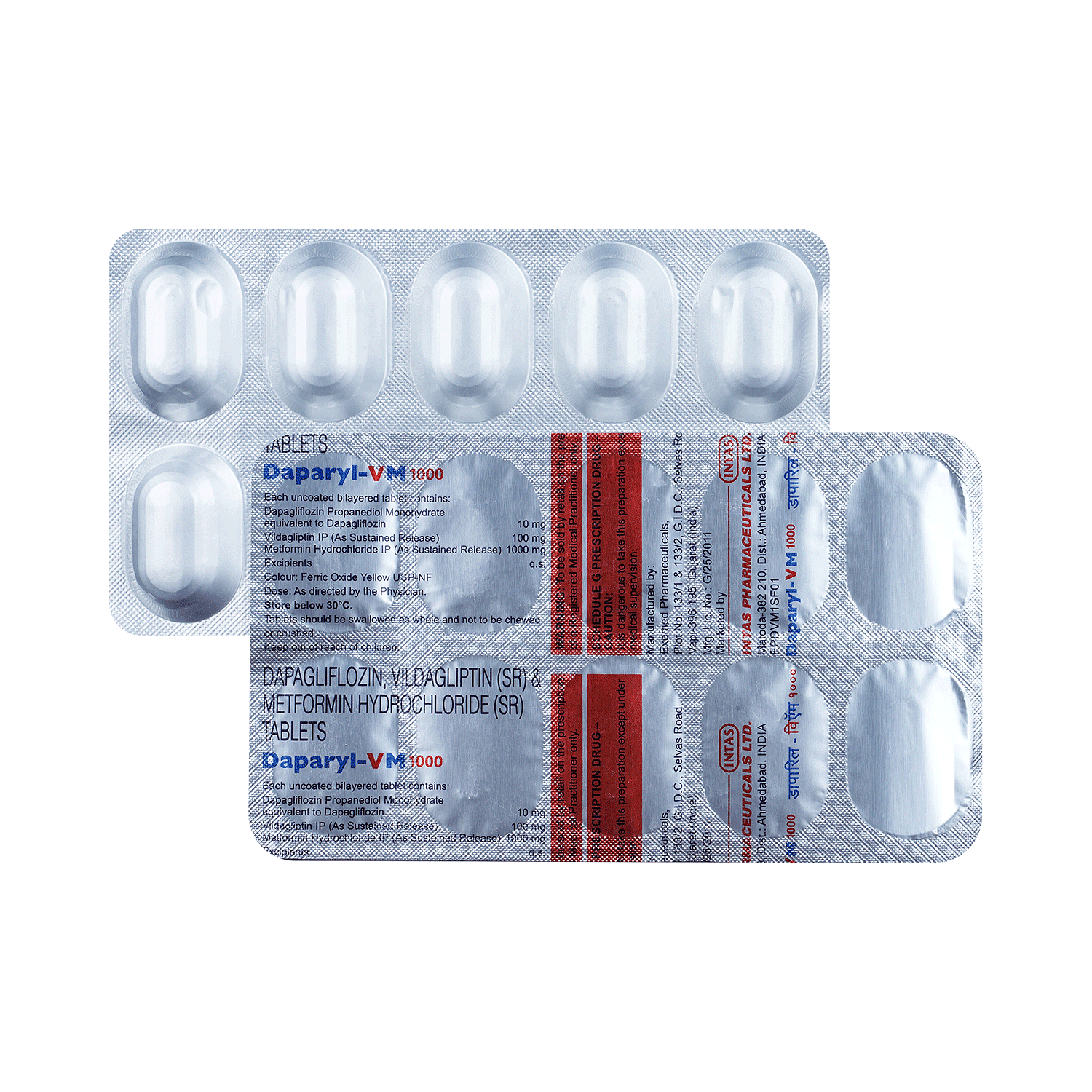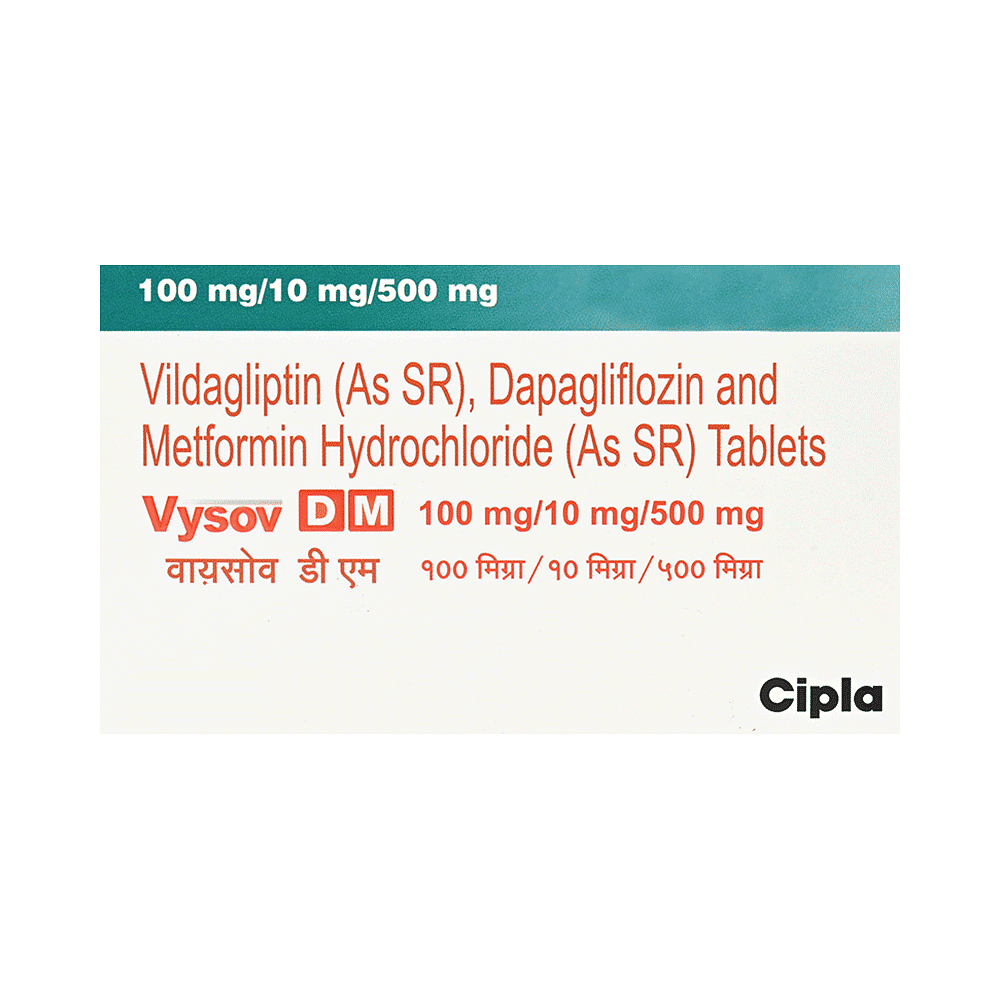
Gluvilda DM 10mg/1000mg/100mg Tablet
Manufacturer
Alkem Laboratories Ltd
Salt Composition
Dapagliflozin (10mg) + Metformin (00mg) + Vildagliptin (0mg)
Key Information
Short Description
Gluvilda DM 10mg/1000mg/100mg Tablet is a combination medicine that helps control blood sugar levels in adults with type 2 diabetes mellitus.
Dosage Form
Tablet
Introduction
Gluvilda DM 10mg/1000mg/100mg Tablet is best taken with food. The dose will be decided by your doctor and don’t stop taking it unless the doctor advises otherwise. If stopped abruptly, your blood sugar levels may increase and can put you at risk of serious complications like kidney damage and blindness. This medicine is only part of a treatment program that should include a healthy diet, regular exercise, and weight reduction as advised by the doctor.
Directions for Use
Take this medicine in the dose and duration as advised by your doctor. Swallow it as a whole. Do not chew, crush or break it. Gluvilda DM 10mg/1000mg/100mg Tablet is to be taken with food.
How it works
Gluvilda DM 10mg/1000mg/100mg Tablet is a combination of three antidiabetic medicines. Dapagliflozin increases urinary glucose excretion and reduces blood glucose levels. Vildagliptin helps control blood sugar levels by increasing substances (incretins) in the body that make the pancreas release more insulin. It also signals the liver to stop producing sugar (glucose) when there is too much sugar in the blood. Metformin decreases the amount of glucose absorbed from your food and the amount of glucose made by the liver. It also increases the body’s response to insulin, a natural substance that controls the amount of glucose in the blood.
Quick Tips
Your doctor will monitor your blood sugar levels regularly when you are taking Gluvilda DM 10mg/1000mg/100mg Tablet. Hypoglycemia (low blood sugar level) may occur when Gluvilda DM 10mg/1000mg/100mg Tablet is taken along with other antidiabetic medicines, or on delaying/skipping a meal. Check your blood sugar levels and have a snack/sugar source for immediate relief. If you get unusually thirsty, pass urine more frequently, and feel tired, let your doctor know. These are the signs of too much sugar in your blood and your dose may need adjusting. Lifestyle changes like a low-fat and salt diet, exercise, not smoking, and cutting down on the amount of alcohol you usually drink may help this medication work better.
Related Medicines

Daparyl VM 1000 Tablet

Vinglyn Trio 10mg/1000mg/100mg Tablet

Vildamac Trio 10mg/1000mg/100mg Tablet

Encelin DM 10mg/1000mg/100mg Tablet

Sulidapa MV 10mg/1000mg/100mg Tablet

Gliptagreat DM 10mg/1000mg/100mg Tablet

Vysov DM 10mg/1000mg/100mg Tablet

Vicemic ODM 10mg/1000mg/100mg Tablet

Zukanorm-DM 10mg/1000mg/100mg Tablet

Vilpower-DM 10mg/1000mg/100mg Tablet
Frequently asked questions
Is Gluvilda DM 10mg/1000mg/100mg Tablet safe for the kidneys?
Gluvilda DM 10mg/1000mg/100mg Tablet is not associated with kidney damage. The kidneys process and eliminate the drug via urine. However, if your kidneys are impaired, this medication can increase the risk of lactic acidosis. Symptoms include tiredness, weakness, muscle pain, sleepiness, abdominal pain, and breathing problems. Seek immediate medical attention if you experience these symptoms.
Can Gluvilda DM 10mg/1000mg/100mg Tablet cause dizziness?
Yes, Gluvilda DM 10mg/1000mg/100mg Tablet may cause dizziness due to its ability to lower blood sugar levels. Sitting or lying down might help if you experience this side effect. Ensure you carry some sugary snacks or fruit juice with you when traveling to avoid dizziness during travel. Remember to monitor your blood sugar level regularly.
Can this medicine be used to treat type 1 diabetes?
This medication does not treat type 1 diabetes or diabetic ketoacidosis (increased ketones in the blood or urine).
Can Gluvilda DM 10mg/1000mg/100mg Tablet cause pancreatitis?
There have been reports of acute pancreatitis associated with Gluvilda DM 10mg/1000mg/100mg Tablet. Patients are advised to stop taking the medication and consult their doctor immediately if they experience persistent severe abdominal pain, sometimes radiating to the back.
What should you not eat while taking Gluvilda DM 10mg/1000mg/100mg Tablet?
It is recommended to avoid high-saturated and trans fat foods. Instead, consume fats from fish and nuts. Manage your carbohydrate intake as it significantly affects blood sugar levels.
Is Gluvilda DM 10mg/1000mg/100mg Tablet safe to use?
Gluvilda DM 10mg/1000mg/100mg Tablet is generally considered safe when used as directed by a physician. However, some side effects can occur. It is essential to take this medication at the prescribed dosage and at the same time daily for optimal results.
Can I stop taking Gluvilda DM 10mg/1000mg/100mg Tablet?
No, do not abruptly discontinue Gluvilda DM 10mg/1000mg/100mg Tablet without consulting your doctor first. Stopping the medication suddenly could worsen your diabetes condition. If you experience symptoms that bother you or if no significant improvement is observed in your condition, inform your physician. They may suggest a different medication.
Can people with diabetes have proteins?
Yes, people with diabetes must incorporate protein into their daily diet along with other essential nutrients. Proteins are vital energy providers and building blocks of the human body, converting into glucose for release. Unlike carbohydrates, protein metabolism is slower; thus, blood sugar spikes might occur a few hours after consuming protein-rich foods. It's advisable to consume 2-3 teaspoons of protein in your evening snacks to prevent hypoglycemia.
Are artificial sweeteners good for people with diabetes?
No, artificial sweeteners are not recommended for individuals with diabetes. Limit or avoid their use as much as possible due to potential health effects.
Can diabetes cause kidney failure?
Yes, uncontrolled diabetes can contribute to kidney failure. Over time, it may lead to diabetic nephropathy, which is a major cause of kidney failure in those with diabetes. Preventing damage to the kidneys requires maintaining good blood sugar control through lifestyle modifications, diet, regular blood testing, and adhering to prescribed medications.
Can diabetes be cured?
Diabetes cannot be completely cured but can be effectively managed through a combination of lifestyle changes, dietary adjustments, medication, and regular medical checkups. By following these guidelines, individuals with diabetes can live healthy and fulfilling lives.


